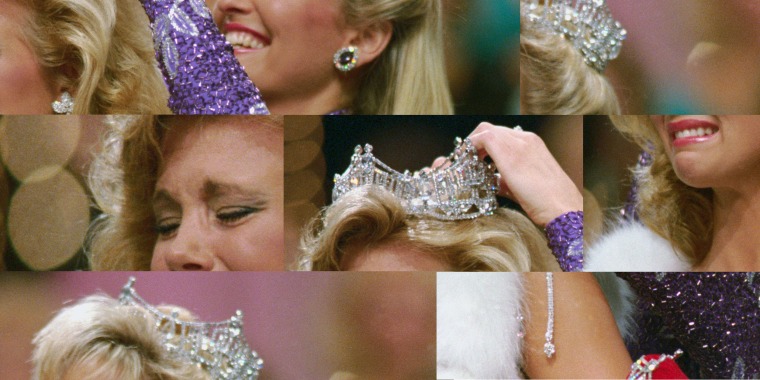One hundred years after the first Miss America was crowned, in 1921, as part of the Inter-City Beauty Contest, the brand is still very much alive. You’d be hard-pressed to find someone who doesn’t have some immediate, even if vague, understanding of what Miss America is — chances are they’ve at least watched “Miss Congeniality” or heard of former Miss America Vanessa Williams and former chairwoman Gretchen Carlson — but it’s far from the appointment television it once was.
Feminists had good reason to side-eye Miss America. Yes, the pageant has evolved over time, just very … very … slowly.
In 1954, 27 million Americans watched Lee Meriwether accept the crown during the first live broadcast of the Miss America pageant. Just five cameras were present at the convention center in Atlantic City, New Jersey, broadcasting the show on ABC. It was a production so subtle that 19-year-old Miss California wasn’t even aware she was on live television when she burst into tears onstage, telling the pageant audience — and viewers at home — that she hoped her late father was proud.
The broadcast was a massive success, and as Amy Argetsinger, author of “There She Was: The Secret History of Miss America,” wrote, “an entire nation wept” along with Meriwether that night.
Part of what gripped people watching in 1954, Argetsinger surmised, was the unscripted nature of the whole spectacle, a window into the emotional life of a stranger in real time. “There have been few such real emotion-packed moments on TV,” wrote a Des Moines Register columnist afterward, while a Los Angeles critic declared that the broadcast contained a narrative arc that “no script writer could have foreseen and injected into the show.” There’s a reason the Miss America pageant has been referred to as “the original reality show.”
But times have changed. In 2021, there are innumerable paths women can take to access a modicum of fame (reality TV is ubiquitous!), a public platform (Instagram! TikTok!) and a way to tout a cause they hold dear (run for political office! Start an online campaign!). Who really needs Miss America?
Participation has dropped, and in 2019, the show’s ratings reached an all-time low; just 3.6 million people tuned in. This year, the festivities, which air Thursday night, moved from NBC proper to its streaming service, Peacock. (MSNBC and Peacock are owned by NBCUniversal.)
The Miss America pageant — and pageants in general — long were low-hanging fruit for fodder in certain feminist circles. The pageant was an easy symbol of a culture that thrives off the objectification of women’s bodies, a clear embodiment of the daily judgements women experience moving through the world based on their pretty privilege (or lack thereof).
Feminists had good reason to side-eye Miss America. Yes, the pageant has evolved over time, just very … very … slowly.
Until the 1950s, pageant rules said participants had to be “of good health and of the white race.” (It would be three decades until Williams became the first Black Miss America and then was promptly forced to relinquish her title because of nude photos. She finally received an overdue apology from the Miss America Organization in 2015.) In 1999, Miss America CEO Robert Beck was fired after pushing to end a long-standing rule that disqualified contestants who had been divorced or had an abortion. In 2017, Miss America CEO Sam Haskell was forced to resign after internal correspondence came to light in which Haskell had disparaged, fat-shamed and slut-shamed former winners.
Until the 1950s, pageant rules stated that participants had to be “of good health and of the white race.”
I came of age with a visceral derision for pageants and all they seemed to symbolize from the outside. I mean … a swimsuit competition?! In this economy?! (The swimsuit competition was officially dropped in 2018.) But I also haven’t had any up-close experience with the pageant world. So I asked my friend Alex, a highly successful, highly educated, politically progressive investment banker who also happens to be a former pageant participant.
Alex looks at pageantry as a form of “high-femme drag,” a socially sanctioned venue for cosplaying a glamorous version of traditional femininity. While she readily acknowledged the pageant world’s more problematic and archaic aspects, she also pointed out that these problems are far from exclusive to the pageant world.
“People treat it like it’s the only place women are rated,” Alex told me. “Having a panel of fabulous men and women in the fashion industry [judge you] in a pageant environment doesn’t hurt nearly as much as the way straight men treat women in daily life — especially in places we’re not supposed to be objectified, like the boardroom.”
Perhaps part of what always made me so uncomfortable about pageantry was how upfront it was about these judgements. It’s icky to confront a system of physical evaluation that you are opted in to every day, whether or not you choose it.
Despite the fact that I have rarely, if ever, actually watched the full Miss America broadcast, I have spent a lot of time in my living room with former pageant girls on another program full of antiquated cultural norms: “The Bachelor.”
Miss America is arguably less culturally relevant today than it ever has been. Perhaps that’s a good thing. If a pageant can just be a pageant, something that some women choose to opt in to — and enjoy — while the rest of us feel no pull toward its centrifugal force of high-drama femininity, why waste time railing against it?
Feminists have rightly moved on to more pressing issues — abortion access, racial justice, workplace sexual harassment and equity, and whether Carrie Bradshaw should have called 911 (!!!!).
Meanwhile, Miss America soldiers on. You can catch her streaming.

